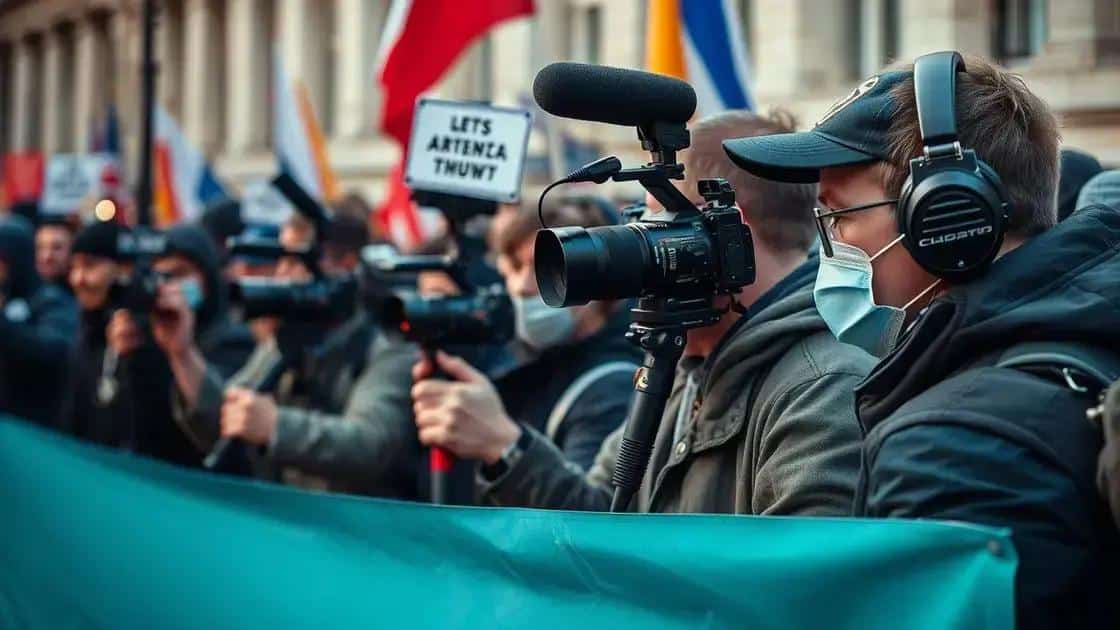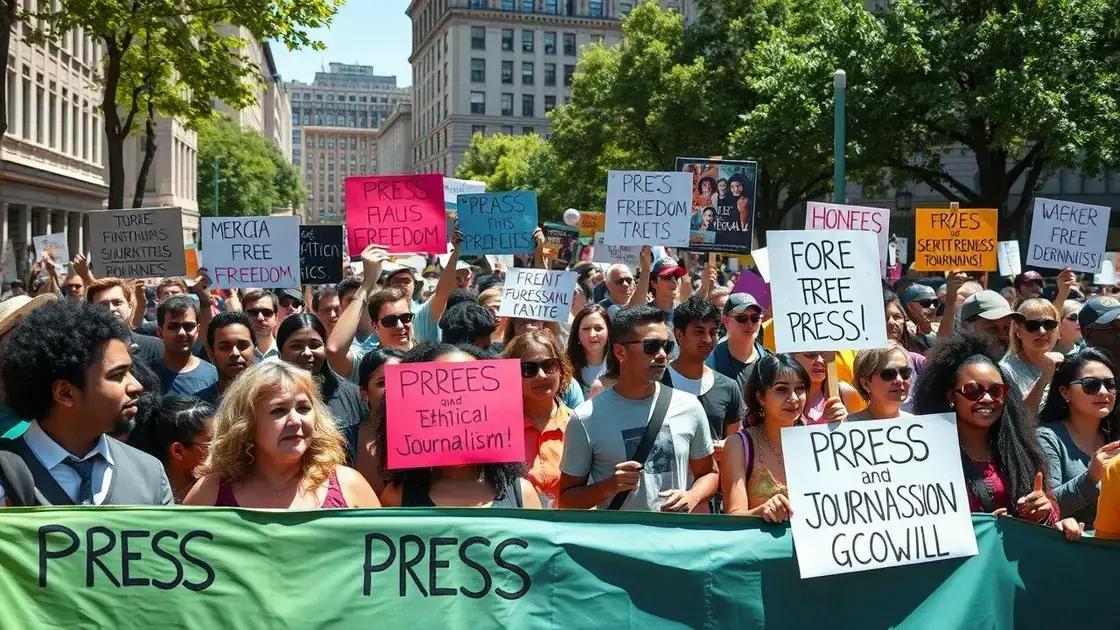Same press freedom watch: uncovering current media challenges

Citizens can support press freedom initiatives by advocating for protective policies, financially backing independent media, and raising awareness on social media to ensure the integrity and accountability of journalism.
Same press freedom watch brings to light the pressing issues faced by media today. Have you ever wondered how these challenges affect the news you consume daily? Let’s dive into the current landscape of press freedom.
Understanding the importance of press freedom
Understanding the importance of press freedom is vital in today’s society. Press freedom not only allows journalists to report without constraints but also empowers citizens to make informed decisions. This freedom is crucial for democracy and holds power to account.
Why press freedom matters
When the press operates freely, society benefits in various ways. A free press promotes transparency and accountability, allowing the public to access information that shapes their understanding of events. Moreover, it fosters diversity in viewpoints, encouraging healthy debates.
- Encourages accountability in government
- Supports public dialogue and engagement
- Promotes diversity in opinions
In contrast, restrictions on press freedom can lead to misinformation and suppression of dissent. Without a free press, citizens may not receive the accurate information necessary for their daily lives.
Challenges to press freedom
Globally, challenges to press freedom are increasing. Journalists face threats, censorship, and even violence. In regions where press freedom is curtailed, the public often remains uninformed about critical issues affecting their lives.
- Increased censorship by governments
- Threats and violence against journalists
- Control over news outlets
By supporting press freedom, individuals can help foster a culture of openness and truth. Overall, understanding the importance of press freedom helps to create a more informed and engaged populace.
Key global challenges to media independence

Key global challenges to media independence affect how news is reported and consumed. Around the world, many journalists face various obstacles that threaten their ability to operate freely. Understanding these challenges is essential for supporting media independence.
Censorship and government control
Many governments impose strict regulations on media outlets. In some countries, censorship prevents journalists from reporting on sensitive topics. This lack of freedom leads to biased news and a misinformed public.
- Restricted access to information
- Heavy penalties for dissent
- Intimidation of journalists
When journalists cannot investigate crucial issues, the public remains unaware of important developments. This situation can foster corruption and abuse of power.
Impact of technology
Technology plays a dual role in media independence. On one hand, advancements provide tools for journalists to share information quickly. On the other hand, it opens the door to surveillance and data collection by governments and corporations.
- Surveillance of journalists
- Use of algorithms to control content
- Spread of misinformation
As misinformation spreads, distinguishing between credible news and false narratives becomes difficult. This trend threatens democratic processes, as citizens may base their decisions on inaccurate information.
To counter these challenges, organizations and individuals must advocate for policies that protect journalists. Supporting initiatives for press freedom ensures that the media remains a strong pillar of democracy, fostering an environment where journalism can thrive.
The role of technology in media freedom
The role of technology in media freedom is increasingly complex. Technology can empower journalists and enhance the quality of information dissemination. However, it can also pose significant challenges to maintaining a free press.
Empowerment through social media
Social media platforms have revolutionized how news is shared. They allow journalists to reach wider audiences quickly. These platforms enable real-time reporting, fostering greater transparency. Journalists can also engage directly with the public, which enhances accountability.
- Wider audience reach
- Immediate feedback from the community
- Ability to bypass traditional gatekeepers
This direct interaction allows for a richer dialogue between the press and the public. However, the speed of information sharing can also lead to the spread of misinformation.
Challenges of censorship
While technology has benefits, it also enables governments and organizations to engage in censorship. Increased surveillance and control over digital spaces can restrict journalists from freely reporting the news. Technologies that filter content often lead to a biased information landscape.
- Increased government surveillance
- Online harassment of journalists
- Algorithms that limit diversity of viewpoints
As these issues grow, it is vital for society to advocate for protections of media freedom. By doing so, we can ensure that technology serves as a tool for empowerment, rather than oppression.
How citizens can support press freedom initiatives

Citizens play a crucial role in supporting press freedom initiatives. Every individual has the power to contribute towards preserving the rights of journalists and ensuring the flow of accurate information. Even small actions can lead to significant change.
Advocating for policies
One way citizens can support press freedom is by advocating for strong policies that protect reporters. By staying informed and participating in discussions about media rights, individuals can raise awareness about the importance of a free press.
- Contacting local representatives
- Participating in community forums
- Signing petitions for media rights
Engaging with lawmakers can create a ripple effect, encouraging officials to prioritize protections for journalists. When the public demands accountability, it can lead to meaningful reforms.
Supporting independent media
Another effective way to promote press freedom is by financially supporting independent media outlets. Subscribing to newspapers, magazines, or online platforms that uphold journalistic integrity helps ensure they can continue their work.
- Donating to non-profit news organizations
- Buying subscriptions to independent publications
- Sharing their content on social media
By backing these outlets, citizens help maintain a diverse media landscape that is less susceptible to government control or corporate influence. This funding enables them to invest in investigative journalism, which is critical for transparency.
Additionally, spreading awareness about the importance of press freedom through conversations and social media can mobilize others to take action. The more people understand the significance of a free press, the more likely they are to support it.
FAQ – Questions Frequently Asked About Supporting Press Freedom Initiatives
Why is press freedom important for democracy?
Press freedom is vital for democracy because it ensures that journalists can report freely, holding those in power accountable and keeping the public informed.
How can I directly support independent media outlets?
You can support independent media by subscribing to their services, donating to them, and sharing their articles to increase their reach.
What actions can citizens take to advocate for press freedom?
Citizens can advocate for press freedom by contacting their representatives, participating in community forums, and raising awareness on social media.
What role does technology play in protecting press freedom?
Technology can empower journalists by providing tools for reporting and spreading information, but it can also enable censorship and surveillance that threaten press freedom.






